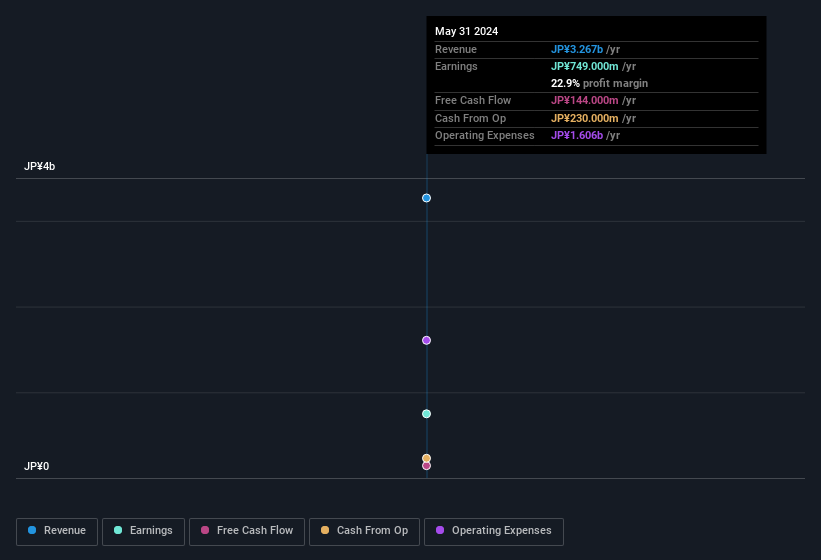We Think That There Are Some Issues For Enjin (TSE:7370) Beyond Its Promising Earnings
The market shrugged off Enjin Co., Ltd.'s (TSE:7370) solid earnings report. We think that investors might be worried about some concerning underlying factors.
Check out our latest analysis for Enjin

Zooming In On Enjin's Earnings
One key financial ratio used to measure how well a company converts its profit to free cash flow (FCF) is the accrual ratio. The accrual ratio subtracts the FCF from the profit for a given period, and divides the result by the average operating assets of the company over that time. The ratio shows us how much a company's profit exceeds its FCF.
Therefore, it's actually considered a good thing when a company has a negative accrual ratio, but a bad thing if its accrual ratio is positive. While having an accrual ratio above zero is of little concern, we do think it's worth noting when a company has a relatively high accrual ratio. That's because some academic studies have suggested that high accruals ratios tend to lead to lower profit or less profit growth.
Over the twelve months to May 2024, Enjin recorded an accrual ratio of 1.48. Ergo, its free cash flow is significantly weaker than its profit. As a general rule, that bodes poorly for future profitability. In fact, it had free cash flow of JP¥144m in the last year, which was a lot less than its statutory profit of JP¥749.0m. Unfortunately, we don't have data on Enjin's free cash flow for the prior year; that's not necessarily a bad thing, though we do generally prefer to be able to see a bit of a company's history.
That might leave you wondering what analysts are forecasting in terms of future profitability. Luckily, you can click here to see an interactive graph depicting future profitability, based on their estimates.
Our Take On Enjin's Profit Performance
As we discussed above, we think Enjin's earnings were not supported by free cash flow, which might concern some investors. As a result, we think it may well be the case that Enjin's underlying earnings power is lower than its statutory profit. The goal of this article has been to assess how well we can rely on the statutory earnings to reflect the company's potential, but there is plenty more to consider. If you'd like to know more about Enjin as a business, it's important to be aware of any risks it's facing. For instance, we've identified 4 warning signs for Enjin (1 is a bit concerning) you should be familiar with.
Today we've zoomed in on a single data point to better understand the nature of Enjin's profit. But there is always more to discover if you are capable of focussing your mind on minutiae. For example, many people consider a high return on equity as an indication of favorable business economics, while others like to 'follow the money' and search out stocks that insiders are buying. While it might take a little research on your behalf, you may find this free collection of companies boasting high return on equity, or this list of stocks with significant insider holdings to be useful.
Valuation is complex, but we're here to simplify it.
Discover if Enjin might be undervalued or overvalued with our detailed analysis, featuring fair value estimates, potential risks, dividends, insider trades, and its financial condition.
Access Free AnalysisHave feedback on this article? Concerned about the content? Get in touch with us directly. Alternatively, email editorial-team (at) simplywallst.com.
This article by Simply Wall St is general in nature. We provide commentary based on historical data and analyst forecasts only using an unbiased methodology and our articles are not intended to be financial advice. It does not constitute a recommendation to buy or sell any stock, and does not take account of your objectives, or your financial situation. We aim to bring you long-term focused analysis driven by fundamental data. Note that our analysis may not factor in the latest price-sensitive company announcements or qualitative material. Simply Wall St has no position in any stocks mentioned.
Have feedback on this article? Concerned about the content? Get in touch with us directly. Alternatively, email editorial-team@simplywallst.com
About TSE:7370
Enjin
Provides public relation (PR) support services for small and medium sized enterprises and medical institutions/doctors.
Flawless balance sheet, undervalued and pays a dividend.
Market Insights
Community Narratives



